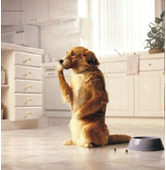BY Dr. Garrett Levin, DVM, Diplomate ACVS
As the holiday season draws near, we look forward to celebrating with family and friends. Our homes fill with the wonderful scents of indulgent food and treats. As tasty as these foods are for us, they can be problematic for dogs.
Dietary indiscretion describes gastrointestinal upset that occurs when a dog ingests something that its body cannot tolerate causing irritation and inflammation of the gastrointestinal tract. The most common cause is when animals get into the trash or are fed people food (“table scraps”).
Most cases of dietary indiscretion are mild and do not have lasting consequences. However, some dogs can suffer severe illness that require more intensive treatment. Pancreatitis is a painful and sometimes life threatening condition resulting from severe inflammation of the pancreas. Dogs that consume non digestible items (such as bones) can develop intestinal obstructions or perforations that are surgical emergencies.
Common clinical signs of dietary indiscretion:
- Diarrhea – small amounts of blood may be noted in the feces
- Loss of appetite and nausea
- Vomit
- Lethargy
- Loud intestinal noises
- Pacing, panting, whining, or showing other signs of abdominal pain and discomfort
Many cases of dietary indiscretion are diagnosed based on symptoms and physical examination by a veterinarian. In severe cases, veterinarians may perform blood and fecal tests, perform abdominal radiographs (x-rays) and abdominal ultrasound (sonogram), as well as other diagnostics to rule out other concurrent abnormalities associated with the clinical signs.
Many mild cases of dietary indiscretion resolve if the dog is fed a special, easily digestible diet “bland diets” such as boiled chicken and rice. More severe cases of dietary indiscretion can result in dehydration and require hospitalization. Please consult with your primary veterinarian if the clinical signs do not quickly resolve on their own. If your primary veterinarian is closed, please call Burlington Emergency and Veterinary Specialists (BEVS) at (802) 863-2387. BEVS is open 24 hours a day, 7 days a week, 365 days a year to advise you on the appropriate actions with regards to your pet’s symptoms.
Here are some additional tips how to keep your pet safe this time of year during your holiday feast:
- Keep garbage in a secure container
- Keep food in the cupboard or refrigerator
- Don’t leave food on the counter or table
- Don’t feed your pet people food (“table scraps”).
- Don’t give your pet bones to chew on

